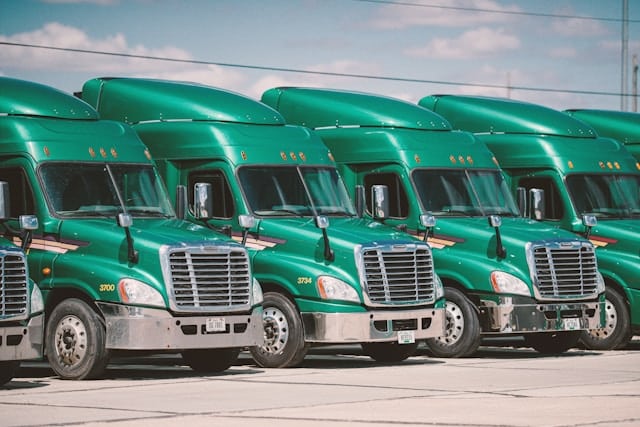For fleet management to be effective, organizations need to keep track of many different factors. Vehicle maintenance, driver well-being, delivery timeliness, and compliance with regulations, there’s a lot to stay on top of. This makes timely and accurate data crucial to the smooth operation of your fleet and it’s where fleet reporting comes into play.
Fleet reporting can provide your organization with real-time insights and data on different elements of performance. Collecting data on things like maintenance, vehicle usage, fuel consumption, and even driver behavior, fleet reporting tools have the power to influence critical business decisions and enhance operational efficiency.
This blog post explores the main benefits of fleet reporting tools, how you can choose the right one for your business, best practices for implementation, and how AI solutions like aiOla are taking fleet reporting to new heights.
What Are Fleet Reporting Tools?

Fleet reporting tools are specific software made to collect and analyze fleet-related data. These tools provide fleet managers with comprehensive insights and data that can be used to improve performance and make decisions that impact fleet safety and efficiency.
There are a range of features fleet reporting software may offer, such as:
- Vehicle tracking
- Route optimization
- Timesheet and schedule management
- Driver performance monitoring
- Maintenance logging
- Fuel consumption
- Compliance analysis
Types of Fleet Reporting Tools
Fleet reporting tools is an all-encompassing term that refers to different types of reporting technologies. Not all of these reporting tools will be necessary for every fleet. While some software may offer a combination of different types of reporting, it’s still important to be aware of the different types of fleet reporting tools out there, such as:
- Telematics systems: These systems combine telecommunications and information to provide detailed data on vehicle speed, location, and other metrics
- GPS tracking: GPS software offers precise location data for all vehicles in a fleet, helping managers reduce unauthorized use, monitor routes, and improve dispatch
- Maintenance management: These tools are used for tracking and scheduling maintenance needs to prevent breakdowns and reduce vehicle downtime
- Fuel management: Tools specifically for fuel management can monitor and analyze consumption to identify inefficiencies and help reduce fuel costs
Benefits of Using Fleet Reporting Tools
According to surveyed fleets, only 23% of respondents are using big data analytics to guide strategic decision-making. This leaves a lot of fleet managers without access to insights on their fleet, and a lot of data left on the table that could make operations safer, more efficient, and cost-effective.
The different range of reports you can create from fleet reporting software gives you the power to really dig deep into the inner workings of your fleet. From improving budgeting to fleet safety management, reporting tools have the ability to give you a lot of deep understanding into what’s working, and what isn’t, in your fleet. Here are a few specific ways fleet reporting tools can benefit your business:
1. Improved Fleet Efficiency
Fleet reporting tools provide real-time data and actionable insights into what’s really going on in your company, helping managers monitor performance more closely. This leads to smoother operations and gives management the ability to make more informed decisions.
2. Save on Costs
By looking at data related to fuel consumption, fleet managers can identify the best routes for more cost-efficient planning. More than that, it can also help pinpoint specific driver behaviors that can be addressed to weed out inefficiencies and wastage.
3. Enhance Safety and Compliance
48% of fleet managers place safety as a top operational priority. By monitoring behavior like speed, braking, and adherence to traffic laws, companies can promote safer driving habits and cut down on accidents. Additionally, these reports can help organizations maintain compliance with regulatory requirements by keeping detailed records of vehicle data.
4. Better Asset Utilization and Scheduling
Teams can make better use of the vehicles in their fleet with reports based on real-time information that shows how assets are used, where they are, and what their status is. For example, reports that help schedule and track maintenance can not only help prevent breakdowns but also give dispatchers and fleet managers better information on how to organize their fleets and routes.
How to Choose the Best Fleet Reporting Tool for Your Business

Selecting the right reporting tool for your fleet is vital for maximizing the benefits you’ll get. You want to find software that isn’t disruptive of your current workflow, can be easily adopted by your team, and helps move you closer to your business goals. When evaluating different fleet reporting options, there are some main considerations to take into account:
- Organizational needs and goals: First and foremost, look at your fleet’s unique requirements and objectives and find a reporting tool that helps you solve issues you may be experiencing and helps you reach the outcomes you want to achieve
- Compatibility with legacy systems: A new reporting tool needs to blend in seamlessly with your existing tech stack to minimize disruptions and ensure the continuous flow of data between your software
- Flexibility and scalability: Find a tool that will grow with your organization as your fleet expands and that can accommodate an increased volume of data without compromising performance
- Cost and ROI: Of course, the cost of a reporting platform is always important to consider, so be sure to look at the initial purchase costs, implementation, training, and ongoing maintenance fees to better understand potential return on investment (ROI)
- User interface and ease of use: The tool you select should be easy for everyone on your team to use so that the learning curve isn’t too steep and it’s widely adopted without too much pushback
- Integration capabilities: Look for a reporting tool that integrates with the platforms you already use or may need to use, such as GPS tracking, telematics, scheduling platforms, and others
Best Practices for Implementing Fleet Reporting Tools
Once you’ve chosen the best fleet reporting tool for your fleet management needs, the next step is strategizing how you’ll implement it within your company. You want to approach this strategically to ensure employees embrace this new technology and use it to its full effect. Here are a few best practices you can use to help ensure the successful deployment of new reporting software:
- Provide comprehensive training and onboarding for all your employees to make sure they understand how to use the tool properly and its purpose
- Establish a few key performance indicators (KPIs) to measure the success of fleet management initiatives and track them within your reporting software
- Regularly analyze data and generate reports to ensure you’re constantly making decisions based on timely and accurate data
- Ensure data accuracy and integrity by implementing checks and validation procedures to verify that the data in your reporting tool is accurate and reliable
- Engage stakeholders like drivers, managers, IT personnel, and others in the implementation process to address implementation concerns and tailor the tool to their needs
- Foster a culture of continuous improvement by regularly gathering feedback assessing the performance of the reporting tool and adapting it as your needs and processes evolve
Stronger Fleet Reporting with aiOla’s Speech AI Technology
Artificial intelligence (AI) technology can complement your fleet reporting tools in a way that increases data accuracy and real-time monitoring. In some cases, it can even replace additional reporting tools altogether. When companies turn to AI, especially automated AI that’s easy to use and implement, like speech AI, they can reap a lot more benefits than they would with one type of software due to AI’s versatility.
aiOla is a speech AI tool that offers fleet managers the flexibility to work the way they want with all the added benefits of reporting tools, and then some. Since aiOla can be used completely hands-free, it often surpasses most reporting tools on their own since data can be collected without any manual intervention, meaning drivers, dispatchers, mechanics, and other employees can always keep their eyes on the task at hand. Not only does this make reporting quicker and more accurate, but it also makes work safer for everyone.
A few ways aiOla can benefit your fleet management and reporting strategy include:
- aiOla understands over 100 languages including different accents, dialects, and industry jargon, and can be used in any acoustic environment, making it perfect for noisy road conditions
- All employees need to do is speak normally and the technology can turn that speech into action and real-time data
- Automate fleet workflows such as inspections in a matter of seconds, with reports filled instantly all using only the power of voice
- aiOla can analyze driver behavior by determining specific metrics in their speech to help report better on safety and compliance
With aiOla, you never need to compromise on the type of reporting software you want or sacrifice usability for features as everything can be done automatically and essential data turned into meaningful insights thanks to the power of technologies like automatic speech recognition (ASR) and natural language understanding (NLU).
Implementing AI for More Efficient Fleet Reporting
Fleet reporting tools themselves give you the power to make decisions that will have a far-reaching impact on your operations. Strengthening your reporting tools with speech AI is just another way to ensure essential data never gets lost and your fleet is operating smoothly and safely. aiOla helps fleet managers ensure the data they’re collecting is up to date and highly accurate by turning speech into action, leaving nothing up to chance for a stronger and more productive fleet.
Book a demo today to see how aiOla works in action and how it can help you improve your fleet reporting capabilities.








